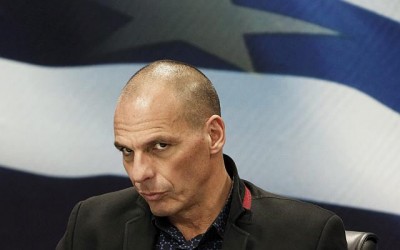Greece and the Eurozone

Monday is a crucial deadline in Greece’s struggle against Brussels-imposed austerity. Eurozone finance ministers are set to meet in the morning to decide whether Greece has made sufficient progress on previous agreements to justify further support. The new leftist government of Greece, Syzira, has rejected provisions in the so-called bailout, saying that the loans have only increased the country’s debt-to-GDP ratio which has ballooned from 115 percent in 2010 more than 170 percent today. Eurogroup ministers have dismissed Syriza’s objections saying that Greece must accept the conditions of the original ($270 billion) agreement or be cut off from additional funding. The confrontation between the Eurogroup and Syriza has set the stage for clash that could trigger a run on the Greek banking system followed by a “dirty exit” of Greece from the Eurozone. The impact this would have on the people of Greece, who have already endured a five year slump worse than the Great Depression, could be catastrophic.
Greek Finance Minister Yanis Varoufakis made the case for changing the terms of the EZ’s programs in an op-ed in the New York Times on Monday. He said:
“The great difference between this government and previous Greek governments is twofold: We are determined to clash with mighty vested interests in order to reboot Greece and gain our partners’ trust. We are also determined not to be treated as a debt colony that should suffer what it must…
We shall desist, whatever the consequences, from deals that are wrong for Greece and wrong for Europe. The “extend and pretend” game that began after Greece’s public debt became unserviceable in 2010 will end. No more loans — not until we have a credible plan for growing the economy in order to repay those loans, help the middle class get back on its feet and address the hideous humanitarian crisis. No more “reform” programs that target poor pensioners and family-owned pharmacies while leaving large-scale corruption untouched.”
(Yanis Varoufakis: No Time for Games in Europe, Yanis Varoufakis, New York Times)
Game theory expert, Varoufakis, denies that he is engaged in a game of chicken to win concessions from Brussels. What he wants is a deal that makes sense, that is, funding assistance with a component for economic growth so Greece can finally emerge from its long-term slump and put its people back to work. The current bailout strategy makes no sense at all from an economic point of view. As we pointed out earlier, accepting loans while shrinking the economy through crippling austerity measures, only generates more red ink and a deeper hole. Even so, Varoufakis’s “modest proposals” are not a blanket rejection of Greece’s obligations to its creditors, they merely adjust the terms of the agreement so that success becomes possible. For example, Varoufakis has recommended that Greece reduce the size of its primary budget surplus to provide more fiscal stimulus for the ailing economy. While an economy with 25 percent unemployment obviously needs more stimulus, Varoufakis’s approach pales in comparison to Obama’s $800 billion ARRA package of 2009 that was aimed at ending the Great Recession. In fact, it’s not really stimulus at all; it is just a reduction in the surplus. (which is “small beer” by any standard) The point is, Varoufakis is not making unreasonable demands. He merely wants an agreement that provides solutions that address the problem, and don’t just add more debt. Here’s more from Varoufakis’s op-ed:
“Our government is not asking our partners for a way out of repaying our debts. We are asking for a few months of financial stability that will allow us to embark upon the task of reforms that the broad Greek population can own and support, so we can bring back growth and end our inability to pay our dues.”
Varoufakis has described the current bailout regime as paying off the mortgage with a credit card. The strategy might buy some time, but it only puts off the inevitable day of default. Strangling the economy through counterproductive belt-tightening measures and the selling of state-owned assets has not improved Greece’s finances at all. It has been an utter failure as the rising debt-to-GDP figures illustrate. Even so, the European Central Bank (ECB) has threatened to cut off liquidity to the Greek banking system if Greece doesn’t capitulate and accept an agreement that only increases the debt, prolongs the slump and deepens the crisis. Does that make sense?
Varoufakis is giving euro-leaders a chance for redemption, a chance to rethink their vision of Europe as a land of prosperity for banks, bondholders and creditors alone. He’s laid down the gauntlet saying that he will meet these lofty Masters of the Universe halfway or, perhaps, more than halfway; but he won’t abandon the working people who have suffered so dramatically under the present regime. He won’t submit to the ECB’s blackmail or give in to Germany’s threats. He’ll stick to his convictions and do what he promised to do because– as he says in his op-ed– “it is right”.
Monday’s negotiations are about more than just Greece. They’re about the future of Europe. Varoufakis wants a Europe that is less divided between debtor and creditor, between German and Greek, between us and them. He is not asking for a reprieve or a bailout or charity. He’s asking Europe’s leaders to take the Union in an entirely different direction, a direction that better reflects the hopes and aspirations the vast majority of working people in the EU. As he says in his op-ed:
“Europe will only regain its soul when it regains the people’s trust by putting their interests center-stage.”
Bravo, Varoufakis.
Mike Whitney lives in Washington state. He is a contributor to Hopeless: Barack Obama and the Politics of Illusion (AK Press). Hopeless is also available in a Kindle edition. He can be reached at [email protected].

